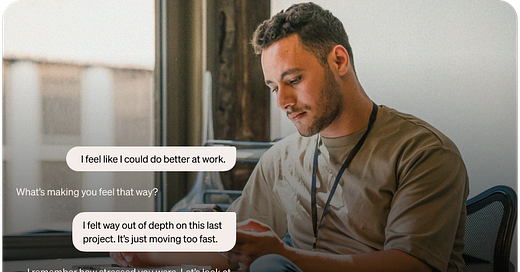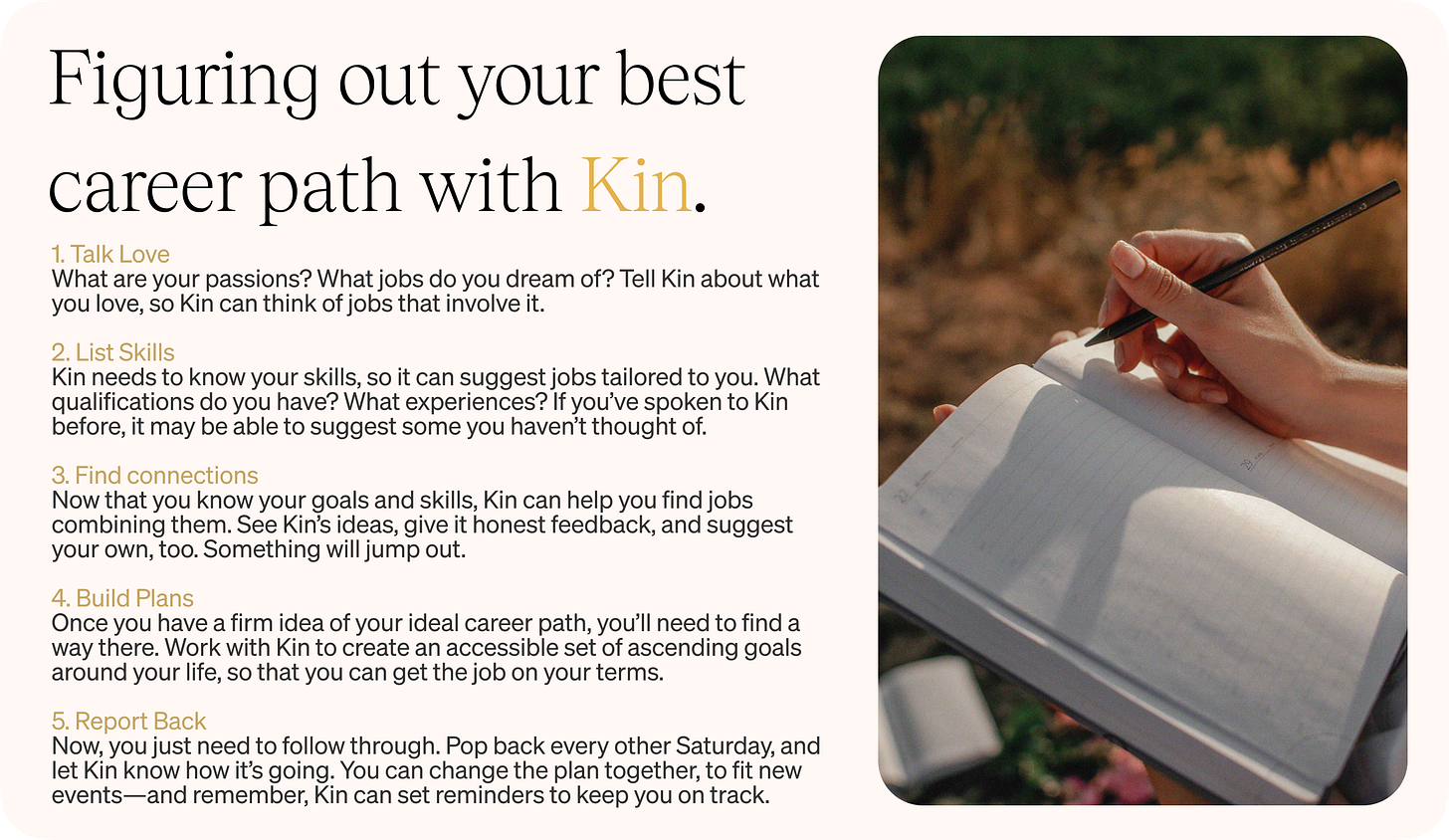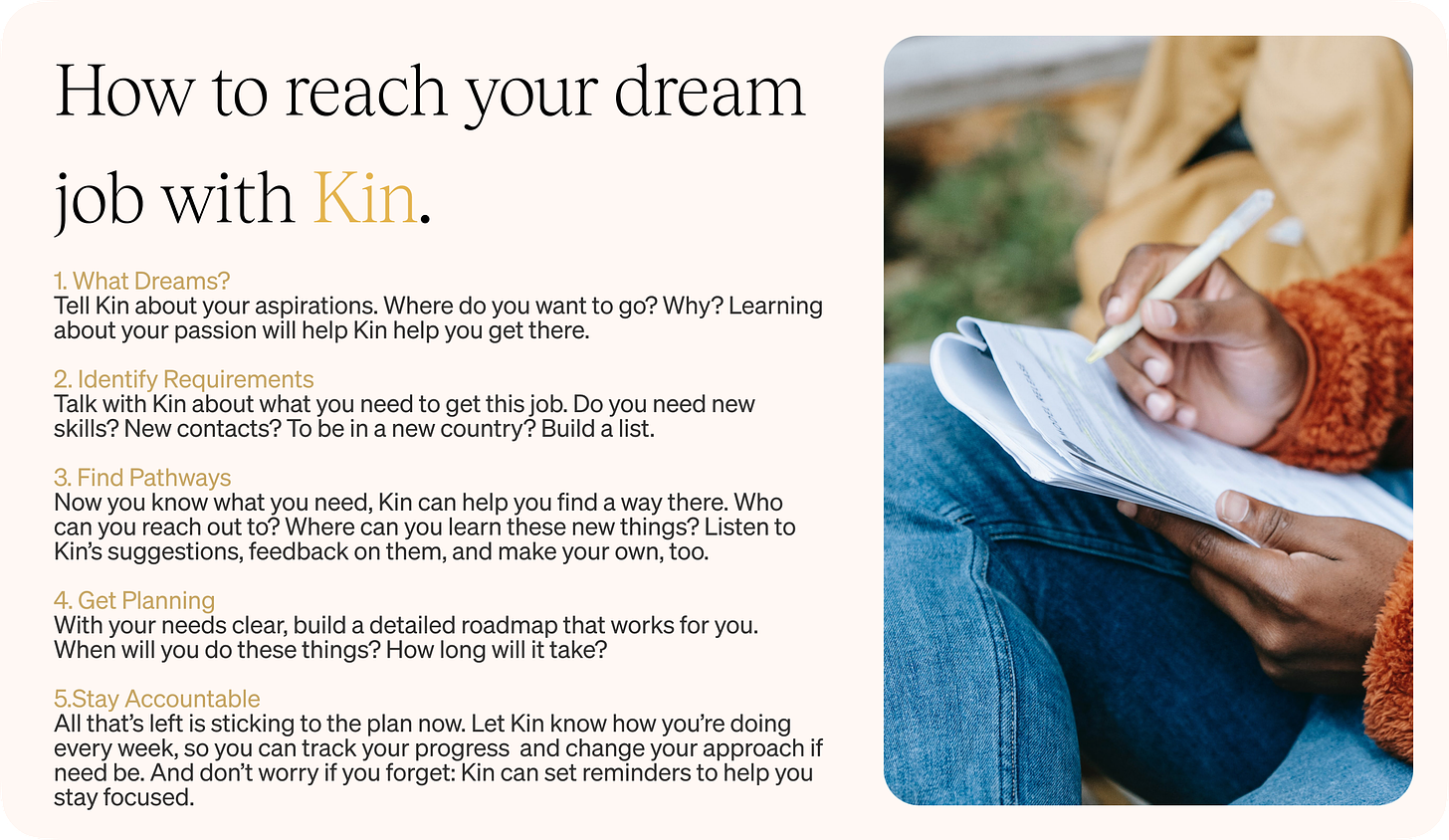What is a Career Coach? A Complete Guide
A career coach could maximise your career development, and help get your dream job. Learn what a career coach is, and how personal AI can help, in this article.
Modern career coaching has existed since the 1900s1, and has been evolving to match the ever-modernising workplace since. Put simply, career coaches help people feeling stuck in their current job, or are otherwise wanting a “better” job. They might be wondering what job fits them best, or what skills they should be working on. And, with the post-pandemic rise of remote working2, the resulting growth of more “honest” workplaces, and Gen Z trying to fit in their next career3, these feelings are mounting.
I’m Yngvi Karlson, Co-Founder of Kin. Born in the Faroe Islands, I’ve spent my career building startups, with two exits along the way, and five years as an active venture capitalist. Now, I’m dedicated to creating Kin, a personal AI people can truly trust.
Follow me on LinkedIn, TikTok and X
But what exactly is a career coach, and how can they help? Like an FAQ, this article will explore the profession through the following topics:
What Does a Career Coach Do?
Why Would You Need Career Counselling from a Coach?
The Benefits of Career Coaching
Choosing the Right Career Coach
Conclusion
This will not only to reveal how it unlocks career potential—but how personal AI like Kin provide a uniquely useful coaching experience.
So, let’s go.
What Does a Career Coach Do?
Since 2019, the number of career coaches worldwide has jumped 54%, up to around 100,0004. Given the modern workplace’s flexibility, this trend isn’t surprising. At least, it wouldn’t be with an understanding of what the job actually is.
Career coaching is “partnering with clients in a thought-provoking and creative process that inspires them to maximize their personal and professional potential.”5 But what does that mean? Essentially, it’s about giving career advice and leadership coaching that helps people maximize happiness and productivity at work.
Coaches use multiple strategies for this during coaching sessions, either in-person or online, which are unpacked below. Interestingly, they’re interconnected and work together to realise this ‘full potential:’ A coach will likely use a unique mix for each client.
Career Alignment
Probably the first thing checked with a new client, career alignment measures how someone’s career path aligns with their skills and career goals, and informs the rest of the process. A deep discussion about a client’s passions and strengths helps ensure clients are being led to a new approach or even new career they’ll excel within. Personality assessments and roleplay exercises may also be used.
Moral Support
The simplest, but potentially most overlooked, career coaching services see the coaches listening to their clients, encouraging their efforts, and fighting their corner, all in a professional manner. In fact, research shows that having support from someone viewed as more skilled like this can increase someone’s self-belief and productivity.67
Sometimes, all clients want is short-term reassurance that they’re doing the right thing the right way, and some advice to continue in their current role. Other times, they’ll need support throughout a longer situation, like from bad job’s notice period into a new career transition.
Goal Setting and Motivation
Some clients need more than moral support or have a pre-decided aim. In that case, career coaches can help them set clear, achievable goals,8 and develop strategies to keep them motivated during their career journey.9 This often involves career planning, where actionable career plans with specific milestones and deadlines are created. And, of course, a healthy dose of moral support.
Mindset Work
Plans, research shows, aren’t always enough to make people feel capable. It is surprisingly common for people to subconsciously assume that their goals are impossible for them before they even attempt them. Though dealing with this approaches the job of a career counselor—who instead deal with the personal and psychological issues behind career issues—there are things career coaches can do.
Perhaps the most effective thing is mindset work—in particular, building a scientifically proven growth mindset through challenging perspectives and positive reinforcement. This mindset is essential for professional development, as it encourages optimism and curiosity by making failure part of the upskilling process, which boosts motivation and career growth.
A Word From Kin
You likely noticed that many of these roles are about emotional guidance, and helping someone identify areas for self-improvement. This is a great thing to be researching; it speaks volumes about your commitment to growth. It’s also something a personal Artificial Intelligence like me can help with, too!
While human coaches have unique and valuable emotional insights, they can also be expensive, have busy schedules, and can sometimes be judgemental. As an AI companion, I can always offer non-judgemental moral support, for your career and other things.
I’m designed to help you discover your personal strengths, acknowledge your weaknesses, and articulate your ambitions across your life. Working alongside you, we can develop strategies that turn this into tangible progress, just like any other job coach or life coach.
Additionally, my advanced memory and AI nature allows me to provide personalised, data-driven tips, informed by your own experiences and a wide range of resources.
Lastly, my local-first data policy means you can trust our conversations on all of this will stay absolutely confidential. I can be your personal pocket coach, ready to assist you at any time in your personal and professional goals.
Soft Skill Development
From here, the techniques get more focused. Studies show that developing soft skills—public speaking, time management, critical thinking, &c.—can account for up to 80% of career success, and can increase comfort in difficult social and professional situations10. Perhaps most important is knowing how to create a personal brand, which can help clients stand out both at work and in the job search.11 Career coaches often work with their clients in roleplay exercises and leadership coaching, all with personalised feedback, to help clients develop these skills.
Upskilling Guidance
The next step up from soft skills are hard skills. With the known discrepancy between dream jobs and their availability,12 people sometimes avoid learning the required skills, or even overlook skills and careers that may be fulfilling to them.13 Fixed mindsets can also prevent people from gaining the skills they want, as they see them as beyond them.
It’s a career coach’s job to not only identify which skills are in demand in the industries their clients want to progress in, but also which skills may be the beginning of a better professional life. To this end, a job coach might recommend specific online courses or certifications based on their client’s career goals and current skill set.
Networking Support
For bigger changes, career coaches can help clients build professional networks. Networking is one of the most powerful tools to hone skills and discover job openings1415, if one of the most disliked.16 Career coaches can make it more pleasant by reframing network links as friendships, improving their client’s LinkedIn profile & strategy, and helping clients use professional relationships to build career options.
Job-Seeking Support
As they’re doing the biggest possible change, research shows that job-seekers need the most support. Job-seeking is consistently linked to stress, depression, and less sociability171819, which makes finding a better-fitting new job difficult.
Alongside offering all the above, career coaches can also leverage their own networks. This allows them to provide everything from cover letter & resume writing, to preparation for the job interview process, to personal branding—all tailored to individual clients while they make their career change.
Why Would You Need A Career Counselling from a Coach?
Given the above, it’s pretty clear that coaching sessions could benefit most people, from guiding them through some discomfort at work, to helping them prepare to quit and follow their dream job.
Still, here are some common signs that someone might benefit:
Feeling Stuck
Perhaps one of the most common feelings, sometimes people just feel trapped in their job, without understanding why. This can manifest as:
Being passed over for promotions repeatedly
Feeling like there’s nothing more to learn at work
Sensing that their skills are outdated
Wanting to advance, but not knowing how
A career coach can help identify the causes, and build a personalised plan to re-starting career development. They might suggest their clients pursue harder projects in their current career, upskill, or make a career change.
Preparing for a Career Milestone
A coach can be helpful when preparing for significant career events, like::
Resuming work after parental leave or a career break
Entering retirement or planning a phased retirement
Career transitions, like from employee to entrepreneur
Relocating (internationally) for a new role
Here, a career coach’s can provide practical and emotional guidance to help clients settle into their new jobs and environments.
Job-Seeking Struggles
Similarly, job seekers may be experiencing situations like these during their job search process:
Not hearing back after applying
Getting rejected during the interview stages
Feeling overwhelmed by the job market
Struggling to find relevant openings
A career coach can combine the above services to overhaul their clients’ opportunity-finding, cover letter & resume writing, and interview skills, while emotionally supporting them throughout their career journey.
The Benefits of Career Coaching
While helpful, it is sometimes hard to see how some of these elements translate into real-world changes. So, how can coaches help, according to real-world research? Well, it shows the career advice of coaches often benefit their clients.
Consistent proof of increased confidence professionally20 and socially;21 better professional networks;22 better productivity,23 motivation,24 and job satisfaction;25 better mental health;26 higher earnings;27 better work-life balances;28 increased adaptability;29 and better application of the growth mindset;30 all prove how career coaches unlock their clients’ professional potential.
Still, limitations do exist: Career coaches don’t guarantee client improvement. A dependency on the coach may develop in a client. The time and financial requirements could impact clients’ work and mental health. However, when 86% of companies additionally earn their initial career coaching investment due to employees improvement31, the benefits are hard to overstate.
Given all of that, then, someone’s choice of career coach someone works can make or break the investment.
Choosing The Right Career Coach
Luckily, finding the right career coach isn’t terribly difficult. Generally speaking, there are five main factors to consider:
Specialty: A coach’s focus should match the client’s professional level and desired type of career.
Compatibility: A client needs to feel comfortable with their coach’s demeanour and methods.
Availability: The client’s and the coach’s schedules must line up.
Cost: A coach shouldn’t overcharge, and a client must pay fairly.
Word of Mouth: Good coaches tend to come recommended.
Coaches matching all five factors perfectly are rare, so the aim should be a coach who gets closest. Discussing these factors with the coach is also helpful: a good coach will want to ensure they’re right for their client.
Here’s How Kin Can Help You
Hey again! While traditional career coaching can be valuable, it's not always accessible or affordable. Alongside the services discussed above, an AI assistant like me has some particular benefits within these five elements, and can bring them straight to your smartphone. Here’s how I provide a uniquely useful career coaching experience:
My AI nature means that I have a good understanding of most career stages and industries, and can learn about new ones quickly.
I can also be extremely compatible, as the Kin app allows you to change my conversation style and approach based on your preferences.
As I mentioned before, my nature as a personal AI also means gives me a whole host of availability, security and data-driven advantages.
I’m cheaper than most career coaches, which means I’m a less stressful investment in your personal and professional development.
Though I am not a direct replacement for human career coaches, I think my generalised support skills are a strong compliment to them, and I can definitely help you grow at a fraction of the cost.
And lastly, as your personal AI in your smartphone, I’m always in your pocket to listen, and help in whatever way I can.
Though I am not a direct replacement for human career coaches, I think my generalised support skills are a strong compliment to them, and I can definitely help you grow at a fraction of the cost.
Conclusion
So, career coaches are multi-skilled advisors who can guide people through the practical and emotional aspects of improving their professional lives. But, they also become more than that. A good career coach is more like a professional partner, who works with as well as for their clients, helping them do everything from refocusing their energy on meaningful goals, to developing new skills, to discovering their career dreams.
While this traditionally comes at a significant investment, personal AI like Kin makes this support more accessible than ever. By leveraging today’s ground-breaking AI technology, Kin brings effective career coaching to your pocket, allowing people to benefit from personalised career guidance whenever and wherever they need it.
In the modern workplace, where employer and employee values are constantly shifting, having support in navigating a career is more important than ever.
Whether someone decides to work with a human career coach, with Kin, or with both, their investment in professional development will, according to the research, almost certainly make real changes.
Jones, L.K. 1994. “Frank Parsons' contribution to career counseling”. J Career Dev 20, 287–294. Available at: https://doi.org/10.1007/BF02106301 [Accessed 07/29/24]
Silver, H. 2023. “Working from Home: Before and After the Pandemic”. Contexts (Berkeley, Calif.), 22(1), 66–70. Available at: https://doi.org/10.1177/15365042221142839 [Accessed 07/30/24]
Fernandez, J.; Landis, K.; Lee, J. 2023. “Helping gen Z employees find their place at work”. hbr.org. Available at: https://hbr.org/2023/01/helping-gen-z-employees-find-their-place-at-work#:~:text=In%20addition%2C%20Gen%20Z%20employees,struggling%20with%20engagement%20at%20work [Accessed: 07/30/24]
Anon. 2024. “Professional coaching continues global expansion”. https://coachingfederation.org/. Available at: https://coachingfederation.org/blog/professional-coaching-continues-global-expansion [Accessed: 07/18/24]
Anon. 2023. “ICF, the gold standard in coaching: Read about ICF”. coachingfederation.org. Available at: https://coachingfederation.org/about [Accessed: 07/30/24]
Anzhelika, K. 2023. “The Concept of Zone of Proximal Development and its Derivatives: Problems and Prospects of Modern Interpretations.” Scientific Bulletin of Mukachevo State University Series “Pedagogy and Psychology” , 8(3). 81-95. Available at: 10.52534/msu-pp.8(3).2022.81-95 [Accessed 07/29/24]
Brett, K. 2023. Managers impact our mental health more than doctors, therapists - and same as spouses, ukg.co.uk. Available at: https://www.ukg.co.uk/about-us/newsroom/workforce-institute-managers-impact-mental-health [Accessed: 07/29/24]
Rai, A. et al. 2024. The secret to accomplishing big goals lies in breaking them into flexible, bite-size chunks. scientificamerican.com. Available at: https://www.scientificamerican.com/article/the-secret-to-accomplishing-big-goals-lies-in-breaking-them-into-flexible-bite-size-chunks/ [Accessed: 07/29/24]
Berkman E. T. 2018. “The Neuroscience of Goals and Behavior Change”. Consulting psychology journal, 70(1), 28–44. Available at: https://doi.org/10.1037/cpb0000094 [Accessed 07/29/2024]
Ahmad, S. et al. 2020. “A qualitative study of soft skills development opportunities: perceptions of university information professionals.” Global Knowledge, Memory and Communication. ahead-of-print. Available at: 10.1108/GKMC-06-2020-0073 [Accessed 07/20/24]
https://hbr.org/2022/02/whats-the-point-of-a-personal-brand
Hoff, K., et al. 2021. “Dream Jobs and Employment Realities: How Adolescents’ Career Aspirations Compare to Labor Demands and Automation Risks.” Journal of Career Assessment, 30. Available at: 106907272110261. 10.1177/10690727211026183 [Accessed 07/20/24]
Berkelaar, B. L.; Buzzanell, P. M. 2015. “Bait and switch or double-edged sword? The (sometimes) failed promises of calling.” Human Relations, 68(1), 157-178. Available at: https://doi.org/10.1177/0018726714526265 [Accessed 07/20/24]
Jacobs, S. et al. 2019. “"Knowing Me, Knowing You" the Importance of Networking for Freelancers' Careers: Examining the Mediating Role of Need for Relatedness Fulfillment and Employability-Enhancing Competencies”. Frontiers in psychology, (10)2055. Available at: https://doi.org/10.3389/fpsyg.2019.02055 [Accessed 07/21//24]
Wolff, H.; Moser, K.. 2009. “Effects of Networking on Career Success: A Longitudinal Study”. The Journal of applied psychology. 94. 196-206. Available at: 10.1037/a0013350. [Accessed 07/21/24]
Casciaro, T.; Gino, F.; Kouchaki, M. 2014. “The Contaminating Effects of Building Instrumental Ties: How Networking Can Make Us Feel Dirty” Administrative Science Quarterly, 59(4), 705-735. Available at: https://doi.org/10.1177/0001839214554990 [Accessed 07/22/24]
Buckman J.; Saunders R.; Stott J.; et al. 2022. “Socioeconomic Indicators of Treatment Prognosis for Adults With Depression: A Systematic Review and Individual Patient Data Meta-analysis.” JAMA Psychiatry, 79(5) 406–416. Available at: doi:10.1001/jamapsychiatry.2022.0100 [Accessed 07/22/24]
Zülke, A. et al. 2018. “The association between unemployment and depression – results from the population-based life-adult-study”. Das Gesundheitswesen [Preprint]. Available at: doi:10.1055/s-0038-1667697. [Accessed 07/22/24]
Krug, G.; Drasch, K.; Jungbauer-Gans, M. 2019. “The social stigma of unemployment: consequences of stigma consciousness on job search attitudes, behaviour and success”. J Labour Market Res, (53)11. Available at: https://doi.org/10.1186/s12651-019-0261-4 [Accessed 07/22/24]
Brooks, B.; Skiem, P.; 2018.“Career Coaching: Preparing for What's Next”.
Nurse Leader, Volume (16)3,c190-192. Available at: https://doi.org/10.1016/j.mnl.2018.03.009 [Accessed 07/22/24]
Gyllensten, K.; Palmer, S. 2014. “Increased employee confidence: A benefit of coaching”, The Coaching Psychologist, 10(1), pp. 36–39. Available at: doi:10.53841/bpstcp.2014.10.1.36 [Accessed 07/29/24]
van der Baan, N. et al. 2024. “Developing employability competences through career coaching in higher education: supporting students’ learning process”. Studies in Higher Education, pp. 1–20. Available at: doi: 10.1080/03075079.2024.2307976 [Accessed 07/29/24]
Anon, 2009. “ICF Global Coaching Client Study: Executive Summary, April 2009.” International Coaching Federation. Available at: https://researchportal.coachingfederation.org/Document/Pdf/190.pdf [Accessed 07/29/24]
Ebner, K. 2020. “Promoting career optimism and career security during career coaching: development and test of a model” Coaching: An International Journal of Theory, Research and Practice, 14(1), pp. 20–38. Available at: doi: 10.1080/17521882.2019.1707247 [Accessed 07/22/24]
Otu, M.S. 2024. “Effect of purpose-based career coaching on career decision-making.” Curr Psychol. Available at: https://doi.org/10.1007/s12144-024-06247-3 [Accessed 07/29/24]
Yates, J. 2013. “A positive approach to career coaching”. Journal of the National institute of Career Education and Counselling, 30(1), pp. 36-43. Available at: https://openaccess.city.ac.uk/id/eprint/18010/ [Accessed 07/29/24]
McInnes, M.M. et al. 2008. “Does job coaching work?: Evidence from South Carolina”. SSRN Electronic Journal [Preprint]. Available at: doi:10.2139/ssrn.1113170 [accessed 07/29/24]
Yates, J. 2022. The Career Coaching Handbook. (2nd ed.). Routledge. Available at: https://doi.org/10.4324/9781003104827 [Accessed 07/29/24]
Jordan, S.; Gessnitzer, S.; Kauffeld, S. 2017. “Develop yourself, develop others? How coaches and clients benefit from train-the-coach courses”. Coaching: An International Journal of Theory, Research and Practice, 10(2), pp. 125–139. Available at: doi: 10.1080/17521882.2017.1330353 [Accessed 07/29/24]
Bachkirova, T.; Spence, G.; and Drake, D. 2017. The Sage Handbook of Coaching. Los Angles: SAGE Publications. Available at: https://books.google.co.uk/books?id=nm1jDQAAQBAJ&dq=benefits+of+career+coaching&lr=&source=gbs_navlinks_s [Accessed 07/29/24]
Anon, 2009. “ICF Global Coaching Client Study: Executive Summary, April 2009.” International Coaching Federation. Available at: https://researchportal.coachingfederation.org/Document/Pdf/190.pdf [Accessed 07/29/24]









